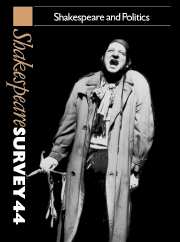Book contents
- Frontmatter
- Shakespeare and Politics
- Language, Politics, and Poverty in Shakespearian Drama
- Some Versions of Coup d’état, Rebellion and Revolution
- Woman, Language, and History in The Rape of Lucrece
- Love in Venice
- Two Kingdoms for Half-a-Crown
- ‘Fashion it thus’: Julius Caesar and the Politics of Theatrical Representation
- ’Demystifying the Mystery of State’: King Lear and the World Upside Down
- Tragedy, King Lear, and the Politics of the Heart
- The Politics of Shakespeare Production
- Shakespeare in the Trenches
- Shakespeare’s Earliest Editor, Ralph Crane
- Shakespeare’s Falconry
- Telling the Story of Shakespeare’s Playhouse World
- Shakespeare Performances in England, 1989–90
- Professional Shakespeare Productions in the British Isles January-December 1989
- Critical Studies
- Shakespeare’s Life, Times, and Stage
- Editions and Textual Studies
- Books Received
- Index
Shakespeare Performances in England, 1989–90
Published online by Cambridge University Press: 28 March 2007
- Frontmatter
- Shakespeare and Politics
- Language, Politics, and Poverty in Shakespearian Drama
- Some Versions of Coup d’état, Rebellion and Revolution
- Woman, Language, and History in The Rape of Lucrece
- Love in Venice
- Two Kingdoms for Half-a-Crown
- ‘Fashion it thus’: Julius Caesar and the Politics of Theatrical Representation
- ’Demystifying the Mystery of State’: King Lear and the World Upside Down
- Tragedy, King Lear, and the Politics of the Heart
- The Politics of Shakespeare Production
- Shakespeare in the Trenches
- Shakespeare’s Earliest Editor, Ralph Crane
- Shakespeare’s Falconry
- Telling the Story of Shakespeare’s Playhouse World
- Shakespeare Performances in England, 1989–90
- Professional Shakespeare Productions in the British Isles January-December 1989
- Critical Studies
- Shakespeare’s Life, Times, and Stage
- Editions and Textual Studies
- Books Received
- Index
Summary
In 1959, in his book on acting, Mask or Face, Sir Michael Redgrave had this to say about Shakespeare in Stratford:
audiences drawn . . . from all over the world come to see Shakespeare’s plays at Stratford-on-Avon with an extra sense of expecting something more (or rather, something else) than they can get at even the most exciting production in other theatres. Some of them come with a sense of dedication. Quite a few, I am sure, come with a feeling of penance. As a gentleman was heard to remark leaving the theatre one night after one or other of the ‘tragedies’: ‘Every bloody play I come to now seems to last more than three hours.’ . . . It sometimes astonishes me that the genius of Shakespeare and the combined skill of the director and actors should succeed in keeping such members of the audience quiet, let alone satisfying them. For really, a number of them have so little idea of what is in store for them that I can well believe the story which was told me by members of the Sadler’s Wells Ballet Company who were performing at that theatre for a fortnight before Peggy Ashcroft and I opened there in The Merchant of Venice. Two ladies were reading their programme for the ballet Coppelia, and one said to the other: ‘Oh dear! We’ve picked the wrong day. Peggy Ashcroft and Michael Redgrave aren’t dancing.
(pp. 103–4)I have never envied the task of the Royal Shakespeare Company nor indeed of the National Theatre. Audiences have not changed that much in thirty years. For all those who arrive with the sense of dedication, more now arrive with a feeling of penance; indeed I have felt, over this year's stint of reviewing both in Stratford and in London, even more strongly than Redgrave's gentleman, that 'every bloody play I come to now seems to last more than four hours' as productions of King Lear seemed to be trying to rival Götterdämmerung. Yet audiences are kept quiet and do leave the theatre satisfied. Some of this year's productions seem more deliberately aimed at one or other segment of Redgrave's audience but a production which aims to do little more than keep its audience quiet may do so by working against what Redgrave calls 'the genius of Shakespeare' and it may turn into much more of a penance than a four-hour tragedy.
- Type
- Chapter
- Information
- Shakespeare Survey , pp. 157 - 190Publisher: Cambridge University PressPrint publication year: 1991
- 1
- Cited by

